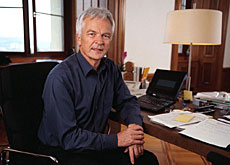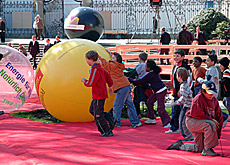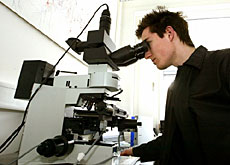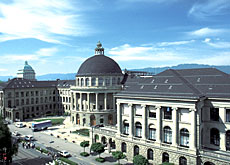Reform never ends at Institute

The Federal Institute of Technology in Zurich, which is celebrating its 150th anniversary, is preparing for another change with its president about to leave.
swissinfo caught up with Olaf Kübler, who says there is still plenty to do to make Switzerland’s most prestigious school more dynamic.
During his eight-year tenure, universities in Switzerland have seen funding stagnate while more and more is being demanded of students and faculty.
Professors have also been asked to climb down from their ivory tower and business has begun to play a bigger role in the way schools are being managed.
But Kübler reckons reforms such as the introduction of the bachelor-master degree system will guarantee the quality of teaching and research in Zurich.
swissinfo: After eight years at the top, are you satisfied?
Olaf Kübler: I realised last year how much I enjoyed my job when I had to decide whether to remain true to my principle of staying no longer than two terms. I think it’s one of the best jobs in Switzerland. You get to know extremely smart and interesting people, with their interests, and I consider that a privilege.
swissinfo: What has been the biggest challenge for you?
O.K.: The challenge, and of course, the biggest reward, has been recruiting the best possible [teaching] faculty. My predecessor and myself made over 200 appointments each, which is more than the current faculty.
swissinfo: Have you been focusing on hiring people abroad or looking at local talent?
O.K.: We’ve looked at both. With a population base of seven million in the country, and an institution the size of ours – bigger than MIT [Massachusetts Institute of Technology] – it is evident you have to look outside Switzerland. It is true the number of Swiss faculty has diminished and we are looking further afield.
swissinfo: You want to attract the brightest students. Is this becoming difficult when science is not necessarily attractive to many young people?
O.K.: Over the past 12 years, enrolment has remained steady, with about 2,000 new students coming in each year.
What changes is the redistribution of the students from year to year. Computer science, for example, had up to 350 new students before the internet bubble burst, when it dropped to 140. However, enrolments didn’t fall, and those who opted out of computer science probably ended up in electrical engineering. It’s a pattern that repeats itself.
swissinfo: The school is undergoing the Bologna reform, introducing the bachelor-master degree system. Has this made it more attractive to students?
O.K: We believe so. We had wanted to introduce it earlier. Explaining the old diploma system was horrendously difficult to someone in Hong Kong or the United States.
When we talk now to other universities about student exchanges, they can see we apply the international system as well as teach courses in English from the second year onwards. We think Bologna also makes us far more attractive to international students.
swissinfo: Extra funding for science is having trouble getting through parliament. Is the fact that politicians have even cut back on some of the universities’ income a problem for you?
O.K.: For the moment, it is a small problem. Here in Zurich, we decided not to complain. What we want to do is build up additional funding from outside sources, and that’s why we have created a specific foundation to do fundraising American-style.
The scientific planning of our competitors shows that if we want to keep up with the best universities in the world, we need fundraising. Our current funding relies more than 90 per cent directly or indirectly – via taxpayers – on the health of the Swiss economy. I can’t see it growing much in the next ten years, so I think to remain competitive the only option is to call on fundraising.
swissinfo: And what target has the institute set itself?
O.K.: We are looking at what’s possible so far in Europe. Our target is an endowment of one annual budget, which is roughly SFr1 billion. It would generate enough cash flow to fund the equivalent of a fairly large department and give us more manoeuvrability and flexibility.
swissinfo: One big trend at Swiss universities has been the promotion of innovation and business awareness. What do you think of this development?
O.K: As a technical university, we have long been associated with engineering or business. As a school, we’ve never been worried about dealing with industry.
But this relationship with business has intensified and changed. Previously, we were mainly dealing with industrial giants with research laboratories similar to our own. Nowadays, dealing with small- and medium-sized enterprises is far more difficult, as they want results quickly.
We are trying to adapt. What we are doing is cultivating our excellent heritage and enhancing it, but it is not a drastic change.
swissinfo: As you prepare to leave soon, what is the one thing you would say the institute needs most?
O.K.: I think we can improve our guidance of incoming students.
Rather than a strict selection process, I would choose to implement an assessment of our applicants. I feel we should stick with the Swiss system, which allows all students with a high school diploma to attend university.
I think an assessment would give students a clear picture of their capabilities, and equate these capabilities with their own desires and the demands of the institute. It should help them realise whether they are likely to succeed or fail here.
If this were to happen, it would change the life of first-year students dramatically. It’s a fight to survive for many of them now. If they were forewarned, they would be more self-reliant and the teaching would be different. I think it could jump start the whole system.
swissinfo-interview: Scott Capper
The Federal Institute of Technology in Zurich was founded in 1855.
More than 12,500 students study at the institute, and around 8,000 staff and faculty work there.
The school’s budget totalled SFr990 million last year, and SFr129 million were invested for construction.
Third-party resources were equivalent to SFr160 million.
Since 1998, less than half the professors recruited come from Switzerland, while 42 per cent of those hired come from Germany and the US.
Olaf Kübler received an education in theoretical physics in Karlsruhe, Zurich (degree), and Heidelberg University (PhD).
In 1972 he joined the Institute for Cell Biology in Zurich, where he worked on computer processing of high-resolution electron microscope images of biological structures.
In 1979 he was appointed professor and founded the computer vision laboratory.
In December 1997 he took over as president of the Federal Institute of Technology in Zurich.
He will leave his position in November.
His sucessor is Ernst Hafen, director of Zurich University’s zoology institute.

In compliance with the JTI standards
More: SWI swissinfo.ch certified by the Journalism Trust Initiative



You can find an overview of ongoing debates with our journalists here. Please join us!
If you want to start a conversation about a topic raised in this article or want to report factual errors, email us at english@swissinfo.ch.